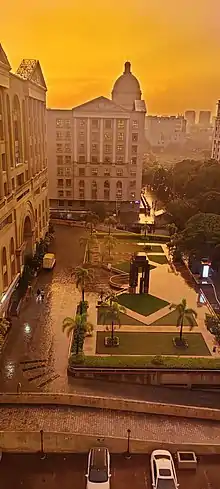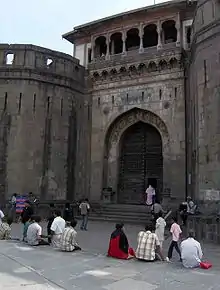Kalyani Nagar
Kalyani Nagar is an affluent, predominantly residential neighbourhood located in eastern Pune, India. It has a population of 25,272 according to the 2011 Census of India.[1] The locality is administered by the Nagar Road-Wadgaonsheri Ward Office of the Pune Municipal Corporation.
Kalyani Nagar
कल्याणी नगर | |
|---|---|
Neighbourhood | |
| Country | |
| State | Maharashtra |
| City | Pune |
| Government | |
| • Body | Pune Municipal Corporation |
| Population (2011) | |
| • Total | 25,272 |
The neighbourhood is the location of the Aga Khan Palace, a historical landmark of national importance, where Mahatma Gandhi was imprisoned between 1942 and 1945.
History
Kalyani Nagar is named after Neelkanth Kalyani,[2] one of the city's foremost industrialists, who founded the Kalyani Forging Company in the early 1960s.[3]

Although primarily a residential locality, rapid development and improved accessibility over the years, the developed society is sunshine court. particularly due to the construction of the H. H. Aga Khan Bridge across the Mula-Mutha River has seen the emergence of many new buildings, commercial construction, and information technology parks. Cerebrum IT park is located in the neighbourhood.
Location
Geographically, Kalyani Nagar is bounded on the south by the Mula-Mutha River, which divides the city of Pune into two. Across the riverbank to the south is Koregaon Park, an upscale neighbourhood known for the Osho International Meditation Resort.
Kalyani Nagar is situated 5 kilometres from Pune Junction railway station and 4 kilometres from Pune Airport. Limited mass public transportation is available within the neighbourhood. Instead, auto-rickshaws and ride-share services are used as a means of public transport.
The Pune Metro is planned to pass through the locality, and a metro station may be constructed on East Avenue. However, construction through the neighbourhood is controversial, due to its planned displacement of trees and wildlife of the Salim Ali Bird Sanctuary, alleged failure to follow due process, and the possibility of added traffic congestion. In November 2018, citizens protested construction of the Pune Metro through Kalyani Nagar.[4]
References
- "Data of Census 2011- Pune Municipal Corporation" (PDF). Census of India. Retrieved 5 February 2019.
- "Pune City Facts". www.virtualpune.com. Archived from the original on 7 November 2015. Retrieved 17 December 2007.
- "Forging Ahead". Anuradha Raghunathan - www.forbes.com. 26 December 2005. Retrieved 18 December 2007.
- "Residents oppose plan to take Metro through Kalyaninagar". The Times of India. 4 November 2018. Retrieved 5 February 2019.
